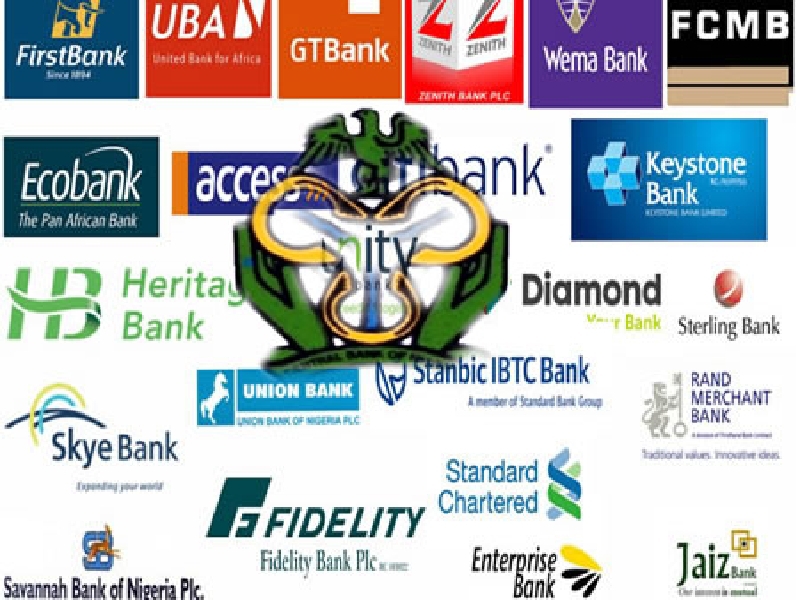Against the Odds: How Nigerian Banks are Expanding Despite Economic Struggles

It has been noted that Nigerian banks are achieving remarkable results and are expected to treble their profit by the end of the year, despite the country’s apparent economic difficulties.
Some banks’ aggressive development in the nation, Africa, and other regions of the world, according to analysts, appears to have sparked conversation.
Access Holdings, Zenith Bank, United Bank for Africa, and GTCO are notable examples of these banks.
Banks’ ongoing prosperity is primarily fueled by aggressive commercial expansion, careful risk management, and a variety of markets that lessen the impact of domestic difficulties.
For the majority of banks, massive investments in information and communication technology (ICT) served as the foundation, and digital banking significantly increased revenue and profitability.
Access Holdings, a financial holding company that operates through four subsidiaries—Access Bank Plc, Access Insurance Brokers Limited, Access Pensions Limited, and Hydrogen Payment Services Company Limited—had N36.6 trillion in total assets as of the end of September 2024. With total assets up to N31.801 trillion, a 54.0 percent increase over the N20.653 trillion recorded at the end of December 2023, UBA is still maintaining a very strong balance sheet. The bank has also benefited greatly from its technology-led initiatives aimed at improving customer experience over the past few years, as evidenced by the rise in total deposits to N26.50 trillion, a 52.7 percent increase, from N17.355 trillion at the end of the previous fiscal year.
With the help of customer deposits, which increased by 42% to N21.6 trillion, Zenith Bank’s total assets increased by 49% to N30.4 trillion.
Despite this, the capital adequacy ratio improved to 21.9 percent, which is far more than what is required by law. GTCO’s total assets increased from N9.691 trillion to N15.615 trillion during the reviewed period.
It is noteworthy that Access Holdings became the financial institution with the biggest turnover during the period under review, reporting gross earnings of N3.415 trillion for the nine-month period.
With N2.939 trillion in gross earnings for the nine months, Ecobank Transnational Incorporated ranks second in terms of turnover.
Third, fourth, fifth, and sixth place went to Zenith, FBNH, UBA, and GTCO, with gross earnings of N2.9 trillion, N2.478 trillion, N2.398 trillion, and N1.798 trillion, respectively.
Wema Bank (N289.117 billion), Sterling (N237.161 billion), Fidelity Bank (N772.465 billion), and Stanbic IBTC (N650.703 billion) are among the banks with turnovers below the N1 trillion threshold. The company with the highest profit after taxes throughout the reviewed period was GTCO. For the nine months, the bank declared a profit of N1.085 trillion. With a N827.277 billion profit after taxes, Zenith Bank comes in second.
With a profit after tax of N533.877 billion for the nine-month period, FBNH comes in third place.
With respective profit after tax of N525.313 billion, N491.879 billion, and N457.746 billion, UBA, Ecobank, and Access Holdings rank fourth, fifth, and sixth.
Ecobank reported total earnings of N2.939 trillion in the third quarter of 2024, up 145.92 percent from N1.195 trillion the year before, making it the bank with the highest turnover growth. When it comes to turnover increase, FBNH comes in second.
For the nine months, the bank made N2.478 trillion in gross earnings.
This represents a 133.95% increase over the N1.059 trillion earned the year before. Third in terms of turnover growth was Zenith Bank.
Promoting
For the nine-month period, the bank reported gross earnings of N2.9 trillion, which was 118.17% higher than the N1.329 trillion reported the year before. Regarding turnover growth, Access Holdings comes in at number four.
Compared to the N1.593 trillion reported the year before, gross earnings for the nine-month period were N3.415 trillion, a 114.31 percent increase.
GTCO’s gross earnings of N1.798 trillion, which increased by 111.47 percent from N850.333 billion the year before, placed it seventh in terms of turnover growth. UBA announced plans to increase its operations and investments in Africa in the future.
In addition, the bank intends to grow in the Middle East by establishing a subsidiary in Saudi Arabia, which has the biggest economy in the region.
After expanding its operations to the United Arab Emirates in 2022, the bank will have its second subsidiary in the Gulf region with this move, which is anticipated to take place within the next year.
Muyiwa Akinyemi, Group Deputy Managing Director of UBA, revealed this during a panel discussion at the 8th Future Investment Initiative (FII) in Riyadh, Saudi Arabia. He also emphasized the bank’s strategic commitment to supporting Africa’s growth through the development of infrastructure, the empowerment of young people, and long-term partnerships in important international markets.
“The next step in our efforts to link the Africa-Gulf region is to establish a presence in Saudi Arabia,” he said.
Read Also: NLC to Withdraw Services if Rivers State FAAC Allocation Is Not Restored
In order to promote knowledge transfer and establish solid business ties, we are thrilled to introduce UBA’s financial services experience to Saudi Arabia.
This project will also give us access to Saudi knowledge in areas like sustainable practices, energy transition, and food security—all of which are vital to Africa’s ongoing progress.
In addition to highlighting Africa’s significance as a long-term capital investment destination, he stated that “Africa’s infrastructure deficit is an opportunity for investors worldwide.”
We emphasize in our presentation to the Gulf and Southeast Asia that they need to consider investing in Africa. As our population grows, food security is now of utmost importance.
As it is in the United States of America by the first quarter of 2026, Access Bank thinks that expansion into the continent and other regions of the world is on track.
Roosevelt Ogbonna, Access Bank’s Group Managing Director, stated, “Access Bank USA will be available.
The US market will be where we operate. We’ll be in a worldwide marketplace, engage in global discussions, and work with many international counterparties.
“Access Bank needs to use trade and payments in the continent if it wants to play in critical sectors,” he said. We have therefore begun what we call an aggregator strategy.
Being a Pan-African bank is meaningless if you have no influence. We therefore understand that we must compete locally and control every market. Eight markets will rank among the top three banks out of the 19 markets that will exist on the continent by 2027. According to him, 11 of these markets will be in the top five banks, and 15 of these markets will be in the top ten banks.
He added, “A local bank, a local African bank that is local in every market that takes significant advantage of those opportunities in African free trade, must exist when international banks pull out.”
GTCO operates banking subsidiaries in Cote d’Ivoire, Gambia, Ghana, Liberia, Kenya, Rwanda, Tanzania, Uganda, Sierra Leone, and the United Kingdom in addition to Nigeria. Additionally, Zenith Bank maintains subsidiaries in The Gambia, Sierra Leone, and Ghana.




